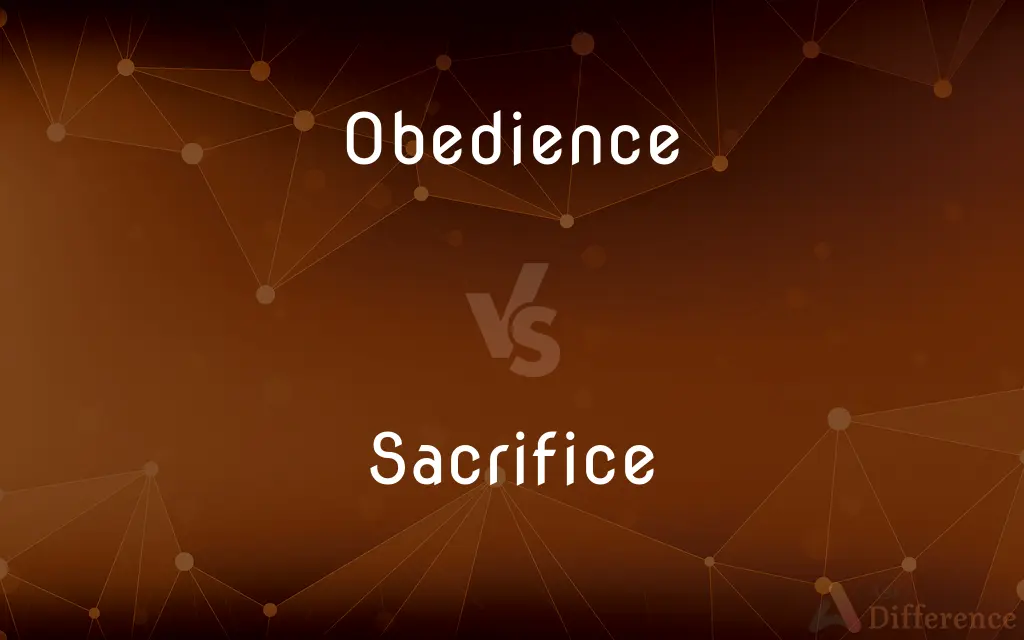Obedience vs. Sacrifice — What's the Difference?
By Urooj Arif & Maham Liaqat — Updated on April 24, 2024
Obedience involves compliance with authority or rules, focusing on adherence; sacrifice entails giving something up of value, highlighting loss for greater good.

Difference Between Obedience and Sacrifice
Table of Contents
ADVERTISEMENT
Key Differences
Obedience is generally about following instructions from an authority or adhering to a set of rules, often seen in societal or organizational contexts. Sacrifice, on the other hand, involves relinquishing something valuable, such as personal time, resources, or desires, usually for the benefit of others or for a larger cause.
In the context of personal development, obedience can help maintain order and discipline, whereas sacrifice often requires a deeper personal commitment and can lead to significant personal growth.
Obedience can be externally motivated, driven by the desire to avoid punishment or gain reward. In contrast, sacrifice is typically internally motivated, stemming from altruism or moral values.
Within relationships, obedience might manifest as following the wishes or directives of another person, which can support harmony and stability. Meanwhile, sacrifice in relationships involves forgoing personal needs or desires to support the well-being or happiness of another, often deepening emotional connections.
In religious practices, obedience is often seen as adherence to specific doctrines or leaders. Sacrifice, however, is frequently about offering something of oneself, such as fasting, donating money, or engaging in volunteer work, as a form of worship or devotion.
ADVERTISEMENT
Comparison Chart
Definition
Compliance with rules or commands from authority.
Giving up something valuable for the sake of others.
Motivation
Often driven by external factors (rewards/punishments).
Generally driven by internal factors (altruism/values).
Key Elements
Adherence, conformity.
Loss, renouncement.
Common Contexts
Laws, regulations, organizational rules.
Personal relationships, religious practices.
Outcome
Maintenance of order, discipline.
Personal growth, enhanced relationships.
Compare with Definitions
Obedience
Observance of religious or moral laws.
His obedience to religious commandments was admirable.
Sacrifice
Forgoing something valued for the sake of other considerations.
He made a sacrifice by giving up his lucrative job to care for his family.
Obedience
The act of obeying an authoritative figure or set of rules.
The soldier's obedience was crucial during the drill.
Sacrifice
An act of giving up personal desires for others' benefits.
His sacrifice for the community was recognized with an award.
Obedience
Compliance with social or legal norms.
Obedience to traffic laws prevents accidents.
Sacrifice
Loss incurred by giving up something.
Her sacrifice of personal time allowed her team to succeed.
Obedience
Submission to higher authority in a hierarchical structure.
Her obedience to the company's protocols earned her a promotion.
Sacrifice
A strategic move in games like chess, involving loss for potential gain.
She made a bold sacrifice of her queen to win the game.
Obedience
Conformity in behavior or action.
The children’s obedience at school made the teacher’s job easier.
Sacrifice
A ritual offering, especially in religious context.
The ancient ceremony involved the sacrifice of crops to appease the gods.
Obedience
The quality or condition of being obedient.
Sacrifice
Sacrifice is the offering of material possessions or the lives of animals or humans to a deity as an act of propitiation or worship. Evidence of ritual animal sacrifice has been seen at least since ancient Hebrew and Greeks, and possibly existed before that.
Obedience
The act of obeying.
Sacrifice
The act of offering something to a deity in propitiation or homage, especially the ritual slaughter of an animal or a person.
Obedience
A sphere of ecclesiastical authority.
Sacrifice
A victim offered in this way.
Obedience
A group of people under such authority.
Sacrifice
The act of giving up something highly valued for the sake of something else considered to have a greater value or claim
Social activism often involves tremendous sacrifice.
Obedience
The quality of being obedient.
Obedience is essential in any army.
Sacrifice
Something given up in this way.
Obedience
The collective body of persons subject to any particular authority.
Sacrifice
Relinquishment of something at less than its presumed value.
Obedience
A written instruction from the superior of an order to those under him.
Sacrifice
Something so relinquished.
Obedience
Any official position under an abbot's jurisdiction.
Sacrifice
A loss so sustained.
Obedience
The act of obeying, or the state of being obedient; compliance with that which is required by authority; subjection to rightful restraint or control.
Government must compel the obedience of individuals.
Sacrifice
(Baseball) A sacrifice bunt or sacrifice fly.
Obedience
Words or actions denoting submission to authority; dutifulness.
Sacrifice
To offer as a sacrifice to a deity.
Obedience
A following; a body of adherents; as, the Roman Catholic obedience, or the whole body of persons who submit to the authority of the pope.
Sacrifice
To give up (one thing) for another thing considered to be of greater value.
Obedience
The act of obeying; dutiful or submissive behavior with respect to another person
Sacrifice
To sell or give away at a loss.
Obedience
The trait of being willing to obey
Sacrifice
To kill (an animal) for purposes of scientific research or experimentation.
Obedience
Behavior intended to please your parents;
Their children were never very strong on obedience
He went to law school out of respect for his father's wishes
Sacrifice
To offer a sacrifice
The Greek warriors sacrificed to their gods.
Sacrifice
To make a sacrifice
Parents sacrificing for their children.
Sacrifice
(Baseball) To make a sacrifice bunt or sacrifice fly.
Sacrifice
(ambitransitive) To offer (something) as a gift to a deity.
Sacrifice
(transitive) To give away (something valuable) to get at least a possibility of gaining something else of value (such as self-respect, trust, love, freedom, prosperity), or to avoid an even greater loss.
Sacrifice
(transitive) To trade (a value of higher worth) for something of lesser worth in order to gain something else valued more, such as an ally or business relationship, or to avoid an even greater loss; to sell without profit to gain something other than money.
Sacrifice
To intentionally give up (a piece) in order to improve one’s position on the board.
Sacrifice
To advance (a runner on base) by batting the ball so it can be fielded, placing the batter out, but with insufficient time to put the runner out.
Sacrifice
To sell at a price less than the cost or actual value.
Sacrifice
To destroy; to kill.
Sacrifice
(medicine) To kill a test animal for autopsy.
Sacrifice
The offering of anything to a god; a consecratory rite.
Sacrifice
The destruction or surrender of anything for the sake of something else; the devotion of something desirable to something higher, or to a calling deemed more pressing.
The sacrifice of one's spare time in order to volunteer
Sacrifice
(baseball) A play in which the batter is intentionally out so that one or more runners can advance around the bases.
Sacrifice
Something sacrificed.
Sacrifice
A loss of profit.
Sacrifice
A sale at a price less than the cost or the actual value.
Sacrifice
The offering of anything to God, or to a god; consecratory rite.
Great pomp, and sacrifice, and praises loud,To Dagon.
Sacrifice
Destruction or surrender of anything for the sake of something else; devotion of some desirable object in behalf of a higher object, or to a claim deemed more pressing; hence, also, the thing so devoted or given up; as, the sacrifice of interest to pleasure, or of pleasure to interest.
Sacrifice
A sale at a price less than the cost or the actual value.
Sacrifice
To make an offering of; to consecrate or present to a divinity by way of expiation or propitiation, or as a token acknowledgment or thanksgiving; to immolate on the altar of God, in order to atone for sin, to procure favor, or to express thankfulness; as, to sacrifice an ox or a sheep.
Oft sacrificing bullock, lamb, or kid.
Sacrifice
Hence, to destroy, surrender, or suffer to be lost, for the sake of obtaining something; to give up in favor of a higher or more imperative object or duty; to devote, with loss or suffering.
Condemned to sacrifice his childish yearsTo babbling ignorance, and to empty fears.
The Baronet had sacrificed a large sum . . . for the sake of . . . making this boy his heir.
Sacrifice
To destroy; to kill.
Sacrifice
To sell at a price less than the cost or the actual value.
Sacrifice
To make offerings to God, or to a deity, of things consumed on the altar; to offer sacrifice.
O teacher, some great mischief hath befallenTo that meek man, who well had sacrificed.
Sacrifice
The act of losing or surrendering something as a penalty for a mistake or fault or failure to perform etc.
Sacrifice
Personnel that are sacrificed (e.g., surrendered or lost in order to gain an objective)
Sacrifice
A loss entailed by giving up or selling something at less than its value;
He had to sell his car at a considerable sacrifice
Sacrifice
The act of killing (an animal or person) in order to propitiate a deity
Sacrifice
(sacrifice) an out that advances the base runners
Sacrifice
Endure the loss of;
He gave his life for his children
I gave two sons to the war
Sacrifice
Kill or destroy;
The animals were sacrificed after the experiment
The general had to sacrifice several soldiers to save the regiment
Sacrifice
Sell at a loss
Sacrifice
Make a sacrifice of; in religious rituals
Common Curiosities
Can obedience involve sacrifice?
Yes, sometimes obedience to rules or commands may require personal sacrifices.
Is sacrifice always voluntary?
Sacrifice is typically voluntary, often driven by moral or personal reasons.
Why is sacrifice considered important in relationships?
Sacrifice is crucial in relationships as it demonstrates commitment and care, often strengthening bonds.
What is the main difference between obedience and sacrifice?
Obedience is about adhering to rules or commands, while sacrifice involves giving up something valuable.
How do obedience and sacrifice differ in a religious context?
In religion, obedience refers to following doctrines, while sacrifice often involves offerings or personal renunciations as acts of faith.
How does sacrifice contribute to personal growth?
Sacrifice can lead to personal growth by fostering resilience, empathy, and a deeper understanding of one's values and priorities.
What are some examples of obedience in everyday life?
Everyday examples of obedience include following workplace rules, adhering to societal norms, and observing laws like speed limits while driving.
Are there negative consequences to excessive obedience?
Excessive obedience can lead to dependency, reduced personal autonomy, and in extreme cases, enable abusive or corrupt authority.
Can sacrifice be detrimental to one’s well-being?
While sacrifice is often seen positively, excessive sacrifice can lead to neglect of one's own needs, resentment, and burnout.
How do cultures around the world view obedience and sacrifice?
Cultural perceptions vary widely; some cultures place a high value on obedience as a virtue that maintains social order, while others may emphasize sacrifice as a cornerstone of community support and familial duty.
Share Your Discovery

Previous Comparison
Perseverance vs. Persistence
Next Comparison
Monarchy vs. AutocracyAuthor Spotlight
Written by
Urooj ArifUrooj is a skilled content writer at Ask Difference, known for her exceptional ability to simplify complex topics into engaging and informative content. With a passion for research and a flair for clear, concise writing, she consistently delivers articles that resonate with our diverse audience.
Co-written by
Maham Liaqat














































